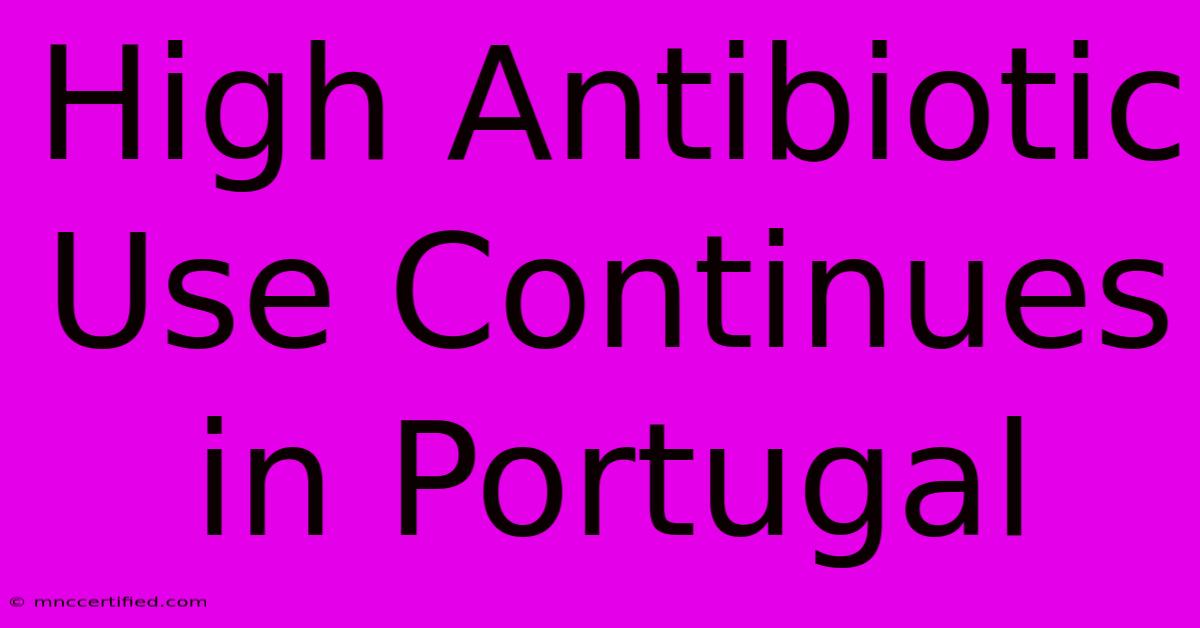High Antibiotic Use Continues In Portugal

Table of Contents
High Antibiotic Use Continues in Portugal: A Growing Concern
Portugal's persistent high rate of antibiotic use presents a significant public health challenge. This article delves into the reasons behind this concerning trend, its consequences, and the potential solutions needed to curb antibiotic overuse and preserve the effectiveness of these life-saving drugs.
The Persistent Problem of Antibiotic Overuse
Portugal consistently ranks among European countries with the highest rates of antibiotic consumption. This isn't a new issue; data from the European Centre for Disease Prevention and Control (ECDC) and national reports consistently highlight this problem. Several factors contribute to this alarming situation:
1. Easy Access to Antibiotics:
One primary driver is the relatively easy access to antibiotics. While a prescription is technically required, the reality is that obtaining them, even without a proper diagnosis, remains easier than in many other European nations. This contributes to self-medication, a major cause of antibiotic resistance.
2. Patient Expectations and Doctor-Patient Dynamics:
Patient expectations play a crucial role. Many individuals expect antibiotics for even viral infections, like the common cold, which are not treatable with antibiotics. The pressure on doctors to satisfy these expectations, coupled with limited time for consultations, can lead to unnecessary prescriptions.
3. Lack of Awareness and Education:
Insufficient public awareness about the dangers of antibiotic overuse and the development of antibiotic resistance is a critical factor. Many people lack understanding of when antibiotics are actually necessary and the long-term consequences of their misuse. Improved public health campaigns are essential to address this knowledge gap.
4. Veterinary Antibiotic Use:
Antibiotic use in livestock farming also contributes significantly to the overall consumption rate. The widespread use of antibiotics in animal agriculture can lead to the development and spread of resistant bacteria, impacting both animal and human health. Stricter regulations and responsible farming practices are necessary to mitigate this issue.
The Consequences of High Antibiotic Use
The consequences of Portugal's high antibiotic consumption are far-reaching and serious:
- Antibiotic Resistance: The most significant consequence is the rise of antibiotic-resistant bacteria. These resistant strains make infections harder and more expensive to treat, potentially leading to longer hospital stays, increased mortality rates, and higher healthcare costs.
- Increased Healthcare Burden: Treating resistant infections requires more expensive and complex treatments, placing a strain on the national healthcare system.
- Public Health Threat: The spread of antibiotic-resistant bacteria poses a significant threat to public health, potentially impacting vulnerable populations like the elderly and those with weakened immune systems.
Potential Solutions and Future Outlook
Addressing Portugal's high antibiotic use requires a multi-pronged approach:
- Strengthening Prescription Regulations: Implementing stricter guidelines and enhancing prescription monitoring could reduce inappropriate antibiotic use.
- Investing in Public Health Campaigns: Raising public awareness about antibiotic resistance and responsible antibiotic use through targeted educational campaigns is crucial.
- Improving Doctor-Patient Communication: Promoting better doctor-patient communication to ensure accurate diagnoses and informed treatment choices is vital.
- Reducing Antibiotic Use in Agriculture: Implementing stricter regulations on antibiotic use in livestock farming and promoting sustainable agricultural practices will significantly reduce antibiotic consumption.
- Surveillance and Monitoring: Robust surveillance systems are needed to monitor antibiotic resistance patterns and inform effective interventions.
Portugal faces a significant challenge in tackling its high antibiotic use. However, by implementing these strategies, combining efforts from healthcare professionals, policymakers, and the public, Portugal can significantly reduce antibiotic consumption and mitigate the threat of antibiotic resistance, ensuring the continued effectiveness of these life-saving medications for future generations.
Keywords: Antibiotic resistance, Portugal, antibiotic use, healthcare, public health, antibiotic consumption, ECDC, antibiotic stewardship, antimicrobial resistance, veterinary antibiotics, self-medication, public health campaign.
Off-Page SEO Strategies:
- Guest Blogging: Contribute articles on this topic to relevant health and science blogs and websites.
- Social Media Engagement: Share the article on relevant social media platforms, engaging with comments and discussions.
- Outreach to Influencers: Contact health professionals and experts in the field to share the article and potentially generate backlinks.
- Forum Participation: Engage in online forums and discussions about antibiotic resistance and Portugal's healthcare system.
- Link Building: Actively seek backlinks from reputable websites related to healthcare, public health, and antibiotic resistance.
This comprehensive approach to on-page and off-page SEO will significantly improve the article's visibility and search engine rankings. Remember to consistently update and refine the content based on performance data.

Thank you for visiting our website wich cover about High Antibiotic Use Continues In Portugal. We hope the information provided has been useful to you. Feel free to contact us if you have any questions or need further assistance. See you next time and dont miss to bookmark.
Featured Posts
-
Joao Cancelo Saudi Football Reality
Nov 19, 2024
-
Pregnant Lawrence Stuns At Governors Awards
Nov 19, 2024
-
North Korean Troops In Ukraine
Nov 19, 2024
-
Broncos Nix Rookie Qb Record
Nov 19, 2024
-
Australia T20 Victory 7 Wicket Win
Nov 19, 2024